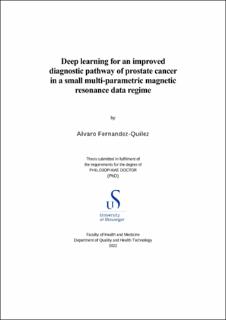| dc.contributor.author | Fernandez-Quilez, Alvaro | |
| dc.date.accessioned | 2022-06-13T13:15:07Z | |
| dc.date.available | 2022-06-13T13:15:07Z | |
| dc.date.issued | 2022-06 | |
| dc.identifier.citation | Deep learning for an improved diagnostic pathway of prostate cancer in a small multi-parametric magnetic resonance data regime by Alvaro Fernandez-Quilez, Stavanger : University of Stavanger, 2022 (PhD thesis UiS, no. 651) | en_US |
| dc.identifier.isbn | 978-82-8439-090-1 | |
| dc.identifier.issn | 1890-1387 | |
| dc.identifier.uri | https://hdl.handle.net/11250/2998565 | |
| dc.description.abstract | Prostate Cancer (PCa) is the second most commonly diagnosed cancer among men, with an estimated incidence of 1.3 million new cases worldwide in 2018. The current diagnostic pathway of PCa relies on prostate-specific antigen (PSA) levels in serum. Nevertheless, PSA testing comes at the cost of under-detection of malignant lesions and a substantial over-diagnosis of indolent ones, leading to unnecessary invasive testing such biopsies and treatment in indolent PCa lesions.
Magnetic Resonance Imaging (MRI) is a non-invasive technique that has emerged as a valuable tool for PCa detection, staging, early screening, treatment planning and intervention. However, analysis of MRI relies on expertise, can be time-consuming, requires specialized training and in its absence suffers from inter and intra-reader variability and sub-optimal interpretations.
Deep Learning (DL) techniques have the ability to recognize complex patterns in imaging data and are able to automatize certain assessments or tasks while offering a lesser degree of subjectiveness, providing a tool that can help clinicians in their daily tasks. In spite of it, DL success has traditionally relied on the availability of large amounts of labelled data, which are rarely available in the medical field and are costly and hard to obtain due to privacy regulations of patients’ data and required specialized training, among others.
This work investigates DL algorithms specially tailored to work in a limited data regime with the final objective of improving the current prostate cancer diagnostic pathway by improving the performance of DL algorithms for PCa MRI applications in a limited data regime scenario.
In particular, this thesis starts by exploring Generative Adversarial Networks (GAN) to generate synthetic samples and their effect on tasks such as prostate capsule segmentation and PCa lesion significance classification (triage). Following, we explore the use of Auto-encoders (AEs) to exploit the data imbalance that is usually present in medical imaging datasets. Specifically, we propose a framework based on AEs to detect the presence of prostate lesions (tumours) by uniquely learning from control (healthy) data in an outlier detection-like fashion. This thesis also explores more recent DL paradigms that have shown promising results in natural images: generative and contrastive self-supervised learning (SSL). In both cases, we propose specific prostate MRI image manipulations for a PCa lesion classification downstream task and show the improvements offered by the techniques when compared with other initialization methods such as ImageNet pre-training. Finally, we explore data fusion techniques in order to leverage different data sources in the form of MRI sequences (orthogonal views) acquired by default during patient examinations and that are commonly ignored in DL systems. We show improvements in a PCa lesion significance classification when compared to a single input system (axial view). | en_US |
| dc.language.iso | eng | en_US |
| dc.publisher | University of Stavanger, Norway | en_US |
| dc.relation.ispartofseries | PhD thesis UiS; | |
| dc.relation.ispartofseries | ;651 | |
| dc.relation.haspart | Fernandez-Quilez, A., Larsen, S. V., Goodwin, M., Gulsrud, T. O., Kjosavik, S. R., & Oppedal, K. (2021, April). Improving prostate whole gland segmentation in t2-weighted MRI with synthetically generated data. In 2021 IEEE 18th International Symposium on Biomedical Imaging (ISBI) (pp. 1915-1919). IEEE. | en_US |
| dc.relation.haspart | Fernandez-Quilez, A., Parvez, O., Eftestøl, T., Kjosavik, S.R. & Oppedal, K. (2022). Improving prostate cancer triage with GAN-based synthetically generated prostate ADC MRI. In Medical Imaging 2021: Computer-aided Diagnosis. International society for Optics and Photonics. | en_US |
| dc.relation.haspart | Fernandez-Quilez, A., Ullah, H., Eftestøl, T., Kjosavik, S.R. & Oppedal, K. (2022). One class to detect them all: Detection and classification of prostate tumors in bi-parametric MRI based on autoencoders. In Medical Imaging 2021: Computer-aided Diagnosis. International society for Optics and Photonics. | en_US |
| dc.relation.haspart | Fernandez-Quilez, A., Eftestøl, T., Kjosavik, S.R. & Oppedal, K. (2022). Learning to triage by learning to reconstruct: A generative self-supervised approach for prostate cancer based on axial T2w MRI. In Medical Imaging 2021: Computer-aided Diagnosis. International society for Optics and Photonics. | en_US |
| dc.relation.haspart | Fernandez-Quilez, A., Eftestøl, T., Goodwin, M., Kjosavik, S.R. & Oppedal, K. (2022). Contrasting axial T2w MRI for prostate cancer triage: A self-supervised approach. In 2022 IEEE 19th International Symposium on Biomedical Imaging (ISBI) IEEE. | en_US |
| dc.relation.haspart | Fernandez-Quilez, A., Eftestøl, T., Goodwin, M., Kjosavik, S.R. & Oppedal, K. (2022). Multi-planar T2w MRI for an improved prostate cancer lesion classification. In 2022 IEEE 19th International Symposium on Biomedical Imaging (ISBI) IEEE. | en_US |
| dc.rights | Copyright the author | |
| dc.subject | prostate cancer | en_US |
| dc.subject | prostatakreft | en_US |
| dc.subject | diagnostiseringsverktøy | en_US |
| dc.subject | MRI | en_US |
| dc.title | Deep learning for an improved diagnostic pathway of prostate cancer in a small multi-parametric magnetic resonance data regime | en_US |
| dc.type | Doctoral thesis | en_US |
| dc.rights.holder | © Alvaro Fernandez-Quilez, 2022. | en_US |
| dc.subject.nsi | VDP::Teknologi: 500::Medisinsk teknologi: 620 | en_US |
| dc.subject.nsi | VDP::Medisinske Fag: 700::Klinisk medisinske fag: 750::Onkologi: 762 | en_US |
